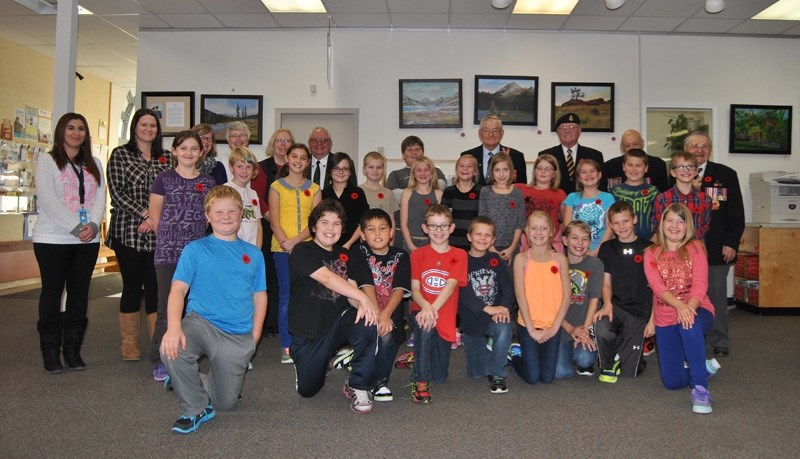For the last three years, in the weeks leading up to Remembrance Day, the Barrhead Public Library has invited a Grade 5 class from Barrhead Elementary School to talk to a group of veterans over tea.
On Monday, Oct. 27 students in Jaime Fisher’s class asked questions and listened to stories from five Canadian military veterans while enjoying tea and cupcakes.
The questions ranged from how fast does a bullet travel, to why they decided to join the military and to were you scared?
Bill Dewitz, a World War II veteran served in Europe, first in Italy, as part of the British Eighth Army and later in Holland, with a Canadian division.
“We were all scared,” Dewitz said. “You never knew when you might be hit by a bullet or a stray piece of shrapnel.”
Another student asked Dewitz what his job was in the army.
As part of the infantry, he said his job was whatever the army wanted it to be.
“There is no job as infantry,” Dewitz said. “They called us the footsloggers, you do a little bit of everything, whatever they asked of you.”
And Dewitz told the students they asked the infantry to do a lot, especially when he was serving in Italy as part of the Eighth Army.
He said the Eighth Army consisted of four or five divisions. A division is a large military unit consisting of about 10,000 troops.
“If there was anything hard or dangerous to do, they would always send the Canadians to do it,” Dewitz said. “Eventually Ottawa said enough of that and we were able to form our own army.”
However, before the Canadians were able to form their own army, they continued to draw very dangerous assignments, including what was his most difficult experience during the war.
“I had been up for three straight days and I told my partner, keep your head down,” Dewitz said, saying he could not stay awake any longer and he fell asleep. “When I woke up I found out my partner had stuck his head up and had been shot by a German sniper. I had to wrap up his dead body in a blanket.” He had only known the man for a short time.
By the time the Canadians reached Holland, Dewitz said they had a much better time of it.
“It was easy, especially compared to Italy,” he said, adding that they still had to be on guard.
Dewitz said there were many times in Holland when the German soldiers were so close they could have waved at them.
“Some times we (Allied and German soldiers) got along pretty good. We would sing, ‘Lilli Marleen’ and they would sing back ‘Roll out the Barrel’,” Dewitz said.
It was during one of these times that Dewitz came close to death as a German sniper took a shot at him.
“I could hear the bullet whizzing by me,” he said. “But I didn’t move and we knew where he was. One of our snipers saw him and took him out.”
In another group, a student asked Herman Barkemeyer, who also served in the infantry, but during the time of the Korean War, why he joined the armed forces.
“I thought it would be an adventure, so I volunteered,” he said. “There was no war. They told us we were going as a peace keeping force, but it turned out to be a real war.”
Especially when the Chinese got involved, Barkemeyer said.
“We were fighting for Korean democracy, but China, a communist country did not want democracy so close to their borders and all of a sudden we were fighting thousands more soldiers who were better equipped than we were,” he said.
Another student asked if he regretted volunteering.
“No, I do not regret joining the army,” Barkemeyer said. “It was terrible and horrible experience, but it helped make me who I am today. I do not regret anything I have done in life.”
However, he wished there had been a better outcome.
“Five hundred and fourteen Canadian soldiers lost their lives in Korea,” Barkemeyer said. “More than 35,000 Americans along with thousands and thousands of other soldiers and civilians on both sides.”
He also said he wished Korea could become united like Germany eventually did.
“If you take a look at South Korea it is one of the most prosperous countries in the world and North Korea is one of the poorest.”
Barkemeyer’s younger twin brother John, also served the in the Canadian Armed Forces, however unlike Herman, his younger brother decided to serve in the Royal Canadian Air Force.
A student from John Barkemeyer’s group asked him if he had ever been to war.
He said he was, but it was a different type of war.
“It was the cold war. In a cold war there is no fighting, but there is a lot of talk and tension,” adding that he was stationed all over Europe, to make sure the Soviet Union and others did not attack.
Lyle Saumer, a Canadian Armed Forces Vetertan who served with the Princess Patricia Light Infantry including two peace keeping tours in Cyprus, told the students he was proud to serve in the Canadian military.
“I believe, without a doubt the Canadian soldier is the best trained soldier in the world,” Saumer said. “They are well prepared to do any job the Canadian government and people ask of them.”
He also told the students how important it is to recognize the contribution Canadian soldiers have made for country.
“Our problem is we only have one day, November 11 to honour our soldiers. They should be honoured everyday. Always be thankful for those who are and have been in the service,” Saumer said. “So if you see a Canadian soldier you should walk up to them and say ‘thank you’ for what you have done. It really means a lot to them.”



